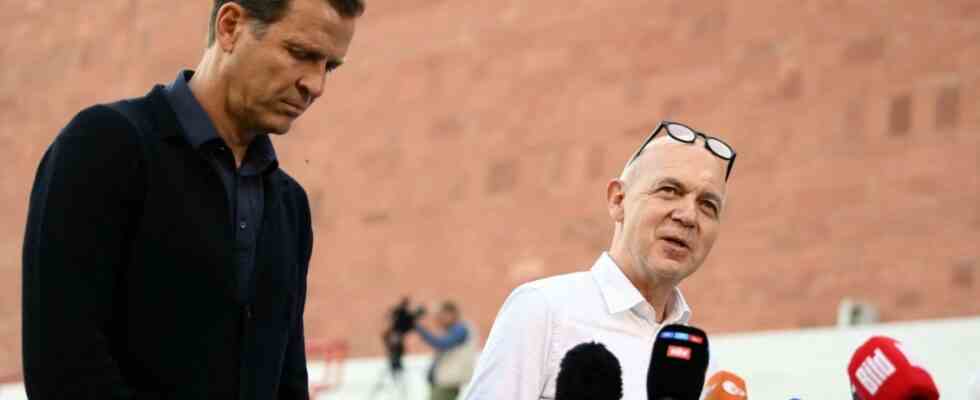It would have been an exciting question on Monday: Would the DFB release a player for the press conference before the round of 16 against Morocco? Or would only the national coach Flick board a shuttle to take the hell tour from the DFB quarters in northern Qatar to the media center in Doha, 76.1 kilometers away? It can be assumed that the Germans would have sent a player. On the other hand, one thing is certain: it doesn’t matter now. The Germans have been home for a long time – and it’s understandable that they’re not sending anyone to appear before the press at this time. Not even the DFB analysis team, which remained in Doha to monitor the tournament, should comment, not even on the future training of right-backs. Any word could be one too many these days.
The general vow of silence should apply at least until Wednesday, on that day there should be a politically curious meeting in Frankfurt. It was as if members of the same faction were conducting coalition negotiations. DFB President Bernd Neuendorf and DFB Vice President Hans-Joachim Watzke had arranged to meet national coach Flick and DFB Managing Director Oliver Bierhoff for a World Cup analysis, which sounds a bit like PowerPoint. However, it should be less about the pressing of the Japanese and the future position of Leon Goretzka, but about the big picture: would these four men continue to work together, and if so, in what constellation?
But before this question could be discussed, the answer came – unusually shortly after 10 p.m. if questions are not possible: Oliver Bierhoff is leaving the DFB.
So there were only the messages from those involved: “I’m paving the way for new decisions,” Bierhoff said in a statement on Monday evening: “Some decisions that we were convinced of did not turn out to be the right ones. That’s regrettable no one more than me. I take responsibility for that.” Bierhoff’s statements came as a double surprise, since he too had remained silent in the past few days.
The official also revised his attitude, expressed immediately after the World Cup on Thursday, that he wanted to head for the 2024 European Championships at home as the next big goal. Instead, he was quoted as follows: “I wish the DFB, its many committed employees, all the associations and clubs, institutions and initiatives gathered under its roof, as well as our national teams, every success in their important tasks.”
It was initially unclear what consequences Hansi Flick’s resignation would have for the future as national coach.
Bierhoff came to the DFB in 2004, in a role that the association had never seen before. As team manager, he was instrumental in the so-called summer fairy tale at the home World Cup two years later, alongside national coach Jürgen Klinsmann. With great success he created a spirit of optimism for the DFB-Elf, which ultimately culminated in the 2014 World Cup triumph in Brazil with Joachim Löw as national coach.
For Bierhoff, parallel to the sporting decline, a continuous loss of acceptance among the fans followed at the latest after the EM-Aus 2016. His marketing concepts were interpreted negatively. The term “The Team” he introduced as a brand message for the national team didn’t catch on at all. The completion of the DFB Academy in Frankfurt as the new association headquarters was a counterpoint to the critical mood and an affair of the heart for the 1996 European champion.
The tournament planning wasn’t going smoothly either. His hymn-acclaimed cabin village Campo Bahia in Brazil was the last stroke of luck as team quarters. There was a lot of criticism for the hotel in Vatutinki near Moscow in 2018 – especially after the World Cup. The Zulal Wellnes Resort in Al-Ruwais in northern Qatar has also become a symbol of an overly sheltered and isolated national team. It has been clear since Wednesday: The stay in the World Cup quarters of Qatar was at least the end of Oliver Bierhoff’s era.

